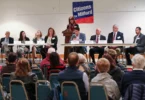
By Joanna Malvas
Boston University News Service
Boston University students yelled “BINGO!” with debate-themed cards while collectively gasping and laughing at the Vice Presidential Debate watch party hosted by BU’s Bridge Club Tuesday on Oct. 1 in the College of Arts and Sciences building. The vice presidential running mates Republican J.D. Vance and Democrat Tim Walz debated a range of topics from key voter issues like reproductive rights — warranting joint sighs across the room — to immigration and U.S. foreign trade policy with countries like China.
The founder and chapter president of BridgeBU, sophomore Lauren Albano, estimated over 80 people attended, including both undergraduate and graduate students, and even post-doctoral students and professors. BridgeBU is a club dedicated to fostering non-polarized conversations about relevant topics in politics and social issues — ‘bridging’ the divides between various communities.

“It was just an explosion of turnout compared to last time,” Albano said.
According to Albano, Bridges’s previous watch party for the Sept. 10 presidential debate between former President Donald Trump and Vice President Kamala Harris only had an estimated turnout of 30 people, with that watch party being the first official event that Bridge had ever hosted.
The CAS Department of Political Science and the CAS Student Programs & Leadership also provided financial support to provide pizza, bingo cards and a bigger room for the watch party.

“Watching the debate with my fellow BU Terriers, there was a sense of commonality, a sense of unity and I could see the atmosphere. Everyone was electric,” senior Rohin Bajaj said. “It’s nine p.m., but I couldn’t have spent it any better way.”
“Here, it’s like you’re kind of set up to watch it on this huge screen in front of you. Everyone’s paying attention. It’s like when you’re watching a movie,” freshman Sophie Kawall said.
Albano also noted the difference in reactions of the last presidential debate versus the vice presidential debate.
“Last debate, with Trump versus Harris, we saw a lot of people laughing only when Trump said something. Meanwhile, I feel like with this one, it was really a tossup to where we were getting lively reactions to both Walz and Vance talking points,” Albano said.
After the debate ended, political science professor Lauren Mattioli opened up the conversation to a free discussion with students about the speech delivery techniques that each candidate used to win the support of voters. Students also reflected on topics that they were both anticipating and surprised to see.
“I’m really glad they brought up the child crisis,” Keesha Theodore, a junior political science student said, referring to the lack of child support for parents in the workforce discussed during the debate. “I want to have kids in the future. I realize it’s very hard between the question of your career and [if] you want to be with your kids.”
Kawall says she wanted to watch the debate since she didn’t know much about Vance and Gov. Walz.
“I still feel the exact same way about the way I’m going to vote. That wouldn’t change for me. But, [the debate] did remind me that you need to keep both sides accountable, no matter what they’re doing,” Kawall said.
Freshman international student Foteini Gnardelli explains why she attended the watch party and was interested in the debate, despite not being able to vote.
“Even if I’m from Greece, and not from the U.S., I want everyone to vote, because it even affects me,” Gnardelli said “I’m stuck here for the next four years — so, might as well have a good president.”
Similarly, Bajaj is also an international student who has been following U.S. politics since 2016 at the wake of Trump’s presidency, calling American elections the most “consequential” elections in world history. Bajaj talked about how healthcare is one of the biggest issues he cares about.
“Me being an international student, I hope to practice medicine in this country. I hope to go to med school, so I know a lot about healthcare. And, it’s quite shocking to see [the] U.S. being one of the most developed countries in the world and not having universal healthcare,” Bajaj said.
Albano describes how she wanted to found Bridge due to the political polarization she witnessed growing up.
“Seeing everything get so highly politicized and seeing the way recent eras of elections have become so divisive [and] so harsh… that has always been something that has been at the forefront of my mind as I wanted to pursue journalism and got more invested in politics. I wanted to start Bridge because it aligned so clearly with my personal passions and objectives,” Albano said.
Bridge, which can be found on Instagram at @bridge.bu, will be hosting future discussions on key voter topics like artificial intelligence and Project 2025.







